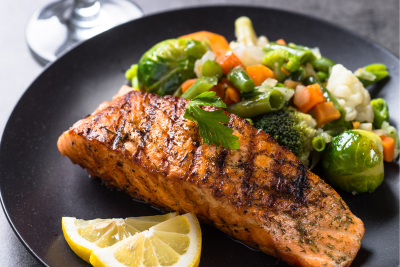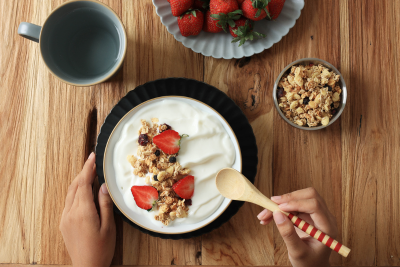It’s National Nutrition Week, and this year we have a great article on Gut Health from Erin Brealey, our Accredited Practising Dietitian and Sports Dietitian. Enjoy!
This year I’m excited to dive into one of my favourite topics… Gut Health!
Gut health & the gut microbiome is a hot topic in the wellness world at the moment, and for good reason! This complex ecosystem of microorganisms living in your digestive tract plays a huge role in your overall health; your gut microbes are important for a wide range of things, including the digestion and absorption of food and nutrients, regulating immune function, brain health and mental health, so suffice to say, it’s pretty darn amazing! I wanted to share some gut health basics today to give you some clarity and research-backed info, because, let’s face it, Facebook, Instagram and TikTok aren’t the best source of health information!
First things first, what is the “Gut Microbiome”?!
 Imagine a bustling city, filled with diverse members of the community – there’s a variety of tradies, a few doctors, the local grocer, a dietitian or 2, a bunch of physiotherapists, teachers, nurses and a range of other essential services. All of these are important to a well-functioning and thriving city. This is a great metaphor for your gut microbiome — when we use the term microbiome, we refer to a complex community of microbes that includes bacteria, fungi and viruses, which live in your digestive system – mostly in the large intestine (colon).
Imagine a bustling city, filled with diverse members of the community – there’s a variety of tradies, a few doctors, the local grocer, a dietitian or 2, a bunch of physiotherapists, teachers, nurses and a range of other essential services. All of these are important to a well-functioning and thriving city. This is a great metaphor for your gut microbiome — when we use the term microbiome, we refer to a complex community of microbes that includes bacteria, fungi and viruses, which live in your digestive system – mostly in the large intestine (colon).
OK, I hear you asking, “don’t we usually try to avoid bacteria, funghi and viruses to be healthy?”. The answer is, yes, but also, no!
It’s the TYPES of microbes that is important. In fact, we need these little microscopic critters in our body; as I mentioned above, they are important in your health and play many roles. Not only that; they digest fibre for us — yes, you read that correctly!The human digestive system simply cannot digest fibre, but it’s crucial we eat it for healthy bowel movements (among other things), so we rely on our gut bugs to digest it for us, and in return they rely on us to provide them with a home and nourishment. So, just like a city that has no plumbers, if your microbiome is out of balance, then you might find yourself up the proverbial creek!
It’s really important to note that there is no single “ideal” food, diet or supplement for your gut microbiome, this is because every single person has a unique composition of bacteria in their gut, think of it like a fingerprint, each of us is completely different! How cool is that?! The types and quantity of microbes in your gut is influenced by a variety of factors, including not just what but also how you eat, exercise, other movement, your environment, genetics and even stress levels and sleep quality!
It’s wise to provide your body, and by extension, your microbiome, with foods rich in nutrients – relying on lower nutrient food (i.e. fast food, very highly processed foods, etc) can be much like putting leaded petrol into a high-end modern car; it’ll work for a while, but eventually it’ll cause trouble. So, just like you’d put premium unleaded in the tank of your brand new car (ok, this was more relevant before they switched to electric!) so it runs smoothly; it’s a good idea to focus on eating in a way that will nourish & fuel both you AND your gut bugs, so you can work at your full potential together.
Why am I so enthusiastic about the gut microbiome?
As mentioned above, your gut really has a powerful effect on every aspect of your health, including –
DIGESTIVE FUNCTION – A well-balanced gut microbiome helps your digestive system break down foods and be better able to absorb and use important nutrients such as vitamins, minerals, proteins and healthy fats. Balancing your gut microbiome goes a long way towards helping to ease common gut symptoms such as bloating, gas, reflux (heartburn), constipation, diarrhoea and stomach discomfort.
MENTAL HEALTH – Ever heard of the gut-brain axis? It’s a term we use for the two-way communication system between the gut and the brain – think of them as 2 friends on a constant phone call. Because of this constant communication, research indicates that your microbiome plays a key role in mental health; it can influence mood, stress and general mental wellbeing. In fact, your gut microbiome can contribute to the production of serotonin, aka one of our “feel-good” neurotransmitters in the brain.
IMMUNE FUNCTION – A happy and healthy microbiome supports your immune system in many ways. It is estimated 70-80% of your immune cells start life in your gut, so your microbiome is central “training”young immune cells to recognise threats and enhancing their responses against pathogens. Your microbiome also helps to balance inflammation levels as the bacteria can produce anti-inflammatory chemicals that circulate around the body. It also aids in maintaining a strong
gut barrier, which is your first line of defence against harmful substances and viruses making their way into your bloodstream.
FERTILITY AND REPRODUCTIVE HEALTH – There is a growing body of evidence of the connection between the gut microbiome and fertility. A balanced gut may positively influence reproductive health for both women and men.
NUTRIENT PRODUCTION – Certain beneficial bacteria can use components from the food you eat to make other important nutrients including Vitamin K, and various B-vitamins such as folate (B9) and B12, right inside your gut!
GLOWING SKIN – A balanced gut microbiome can have a positive impact on your skin. Conditions such as eczema, some forms of acne and psoriasis have been linked to imbalances in the gut microbiome.
REDUCED CHRONIC DISEASE RISK – A study conducted in 2020 revealed a strong connection between gut microbiome health and the risk of various health conditions including heart disease and type 2 diabetes.Choosing more highly processed, low fibre & higher sugar foods, was linked to gut microbes that can elevate risk factors for chronic diseases. On the other hand, a diet rich in high-fibre foods such as wholegrains, vegetables, nuts & seeds, and lean protein foods (fish, lean meat, low fat dairy, soy) has been associated with a healthier gut microbiome, and in turn, a lower risk of chronic diseases. Foods rich in poly-unsaturated fats (plant oils, nuts, seeds, avocado, oily fish) also encourages the growth of helpful gut microbes, further reducing disease risk.
A Gut Health Dietitian’s 6 Top Tips to Support your Microbiome Buddies
- Diverse Diet- Include as much variety in your diet as possible. Choose foods from all the food groups and eat a range of different foods from within each food group.
- Focus on Fibre – Think lots of colourful fruit & veg, wholegrain cereals, nuts, seeds and legumes. These foods encourage a diverse microbiome by providing nourishment for your gut bacteria, and are an excellent choice to make up the majority of your day to day foods.
- Be mindful of certain foods – Research indicates that when a large proportion of your regular diet is highly processed foods such as deli meats e.g. salami, chorizo, sausages, and highly palatable and energy dense foods low in fibre, e.g. ice cream, chips and fast food, can encourage the growth of microbes that are associated with higher risks of chronic disease.
* This is not to say these foods are evil or you should avoid them completely, but it helps to be mindful about how often you choose these in place of more nutritious options. - Include Pre and Probiotic Foods – Think of probiotics as adding more good citizens to your Microbe Metropolis, and prebiotics as the food that feeds the citizens: the word “prebiotic” is just a fancy term for the type of fibre that gut bugs love to eat, and “probiotics” is the term we use for the helpful bugs. It’s Important to highlight that I am specifically talking about pre and probiotic FOODS, and not supplements.Eating whole foods is the best way to provide your gut with the nourishment it needs, as the work required to break down whole-foods is also an important piece of the gut health puzzle. In fact, taking probiotic supplements for too long can actually have a detrimental effect on your overall gut health as it can result in the types of bacteria in the supplement outnumbering all the other microbes in your gut – this means your microbiome can become imbalanced, which is not ideal. Quantity AND variety of bacteria makes for a healthy gut microbiome!
* Some of my favourite PREbiotic foods include- rolled oats, beetroot, cooked & cooled pasta,watermelon, chickpeas, pistachios and nectarines.
* When it comes to PRObiotics, fermented foods are where it’s at! Some great probiotic rich foods include- Greek yoghurt (plain or flavoured), kefir and other fermented dairy products, fermented soy such as tofu and tempeh, fermented veg like kimchi and sauerkraut. - Go easy on the antibiotics – Antibiotics are important and necessary to help you get over some illnesses,but they are not necessary or effective against the common cold or viruses like influenza. Taking Antibiotics too often can be like a tornado passing through your gut, they don’t just wipe out the ‘baddies’, they can take down some of the ‘good guys’ too. And, with regular use, antibiotics can become less effective, so you end up needing larger doses, which can lead to disaster for your microbiome. So, the best course of action is to take antibiotics only when really necessary and recommended by a doctor.
*I am not a medical doctor and am in no way implying that you should never use antibiotics. If you have a bacterial infection such as sinus, chest, ear or urinary tract infections, antibiotics are important to fight the pathogens causing these types of illnesses. - Get Moving – Exercise isn’t just good for your muscles and bones; it also promotes a healthier gut environment. Research indicates that moving your body regularly is associated with increased microbial diversity and more growth of beneficial bugs. Evidence also indicates it can boost the gut barrier and stimulate the production of important substances and nutrients that help to maintain a healthy gut environment.
The Bottom Line
A well-nourished gut microbiome might be the missing piece to the puzzle in fine-tuning your nutrition, exercise performance and overall health.
Why not try some of these tips toward improving your gut health – and if you do, let me know how it feels!
About Erin Brealey
Erin is an Accredited Practising Dietitian and Sports Dietitian, who specialises in helping people rebuild their relationship with food and focusing on healthy nourishment over restriction. Erin also specialises in gut health and irritable bowel syndrome (IBS). Erin loves to provide tailored nutrition advice to empower individuals to achieve their health and performance goals. Erin prides herself on providing evidence-based, practical and individual-focused nutrition advice.
relationship with food and focusing on healthy nourishment over restriction. Erin also specialises in gut health and irritable bowel syndrome (IBS). Erin loves to provide tailored nutrition advice to empower individuals to achieve their health and performance goals. Erin prides herself on providing evidence-based, practical and individual-focused nutrition advice.
Prior to her career as a Dietitian, Erin was a fitness professional, and from her experience in working with a wide range of people, saw firsthand how confused many people are by conflicting nutrition information found online and in the media.
As an experienced and empathetic health professional, Erin sees her role as a resource to provide information and insight to end the confusion that surrounds nutrition, and teach people practical and simple strategies for long lasting change.
Erin offers appointments on Thursday afternoons here at Sandgate Physical Health Clinic, she also provides online appointments if you can’t make it into the clinic.
Book now by calling SPHC on 3869 1099 or BOOK ONLINE.
Read more about Erin’s Dietitian Services, or contact her directly via email – hello@erinbrealey.com.




